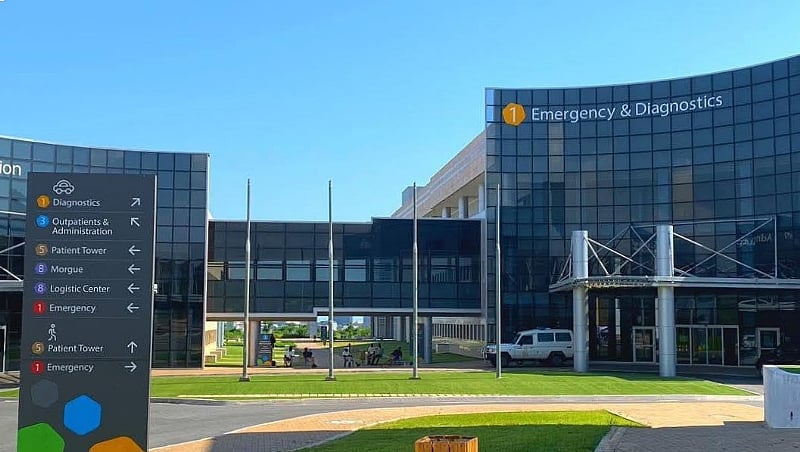Paragraph 1: The University of Ghana Medical Centre (UGMC) has achieved a significant medical milestone by successfully performing Ghana’s first laparoscopic bariatric surgery, a minimally invasive procedure designed to induce weight loss. This achievement marks a turning point in the nation’s healthcare landscape, offering a new, effective approach to combat the increasing prevalence of obesity and its associated health risks. The groundbreaking surgery, known as a laparoscopic sleeve gastrectomy, was performed in collaboration with a multidisciplinary team at UGMC, spearheaded by Dr. Kennedy Ondede, a renowned bariatric surgeon from Kenya.
Paragraph 2: The laparoscopic sleeve gastrectomy, which has gained considerable traction in other parts of Africa, involves the removal of approximately 60-80% of the stomach through small incisions, or “keyholes.” This reduction in stomach size limits food intake, facilitating weight loss while still allowing for balanced nutrition. Importantly, this procedure is not solely focused on aesthetics. It also plays a crucial role in mitigating or reversing serious obesity-related health complications such as hypertension, type 2 diabetes, infertility, and joint problems. Dr. Ondede highlighted the transformative impact of the surgery, citing cases where patients have experienced improved fertility and reduced reliance on medication for chronic illnesses.
Paragraph 3: The procedure is primarily recommended for individuals with a Body Mass Index (BMI) exceeding 30, the threshold for obesity according to the World Health Organization (WHO). While generally safe, the surgery carries potential risks, including infection, leakage along the staple line, and malnutrition if post-operative care is not diligently followed. Dr. Ondede emphasized that with appropriate equipment and training, the success rate is impressively high, exceeding 90%. He also stressed the importance of lifestyle modifications for individuals who are not candidates for surgery or prefer alternative approaches, recommending a balanced diet, reduced sugar intake, and regular exercise for weight management.
Paragraph 4: The introduction of bariatric surgery at UGMC was the culmination of over a year of meticulous planning and preparation by the medical team, led by Dr. Dominic Darkwa, a Consultant General Surgeon at the facility. He underscored the urgency of addressing obesity in Ghana, citing a concerning prevalence rate of 17-20% among the adult population. This high prevalence exposes a significant portion of the population to a range of health risks, including heart disease, diabetes, arthritis, and respiratory problems. The successful execution of the first laparoscopic sleeve gastrectomy represents a significant step towards providing much-needed care for this vulnerable population.
Paragraph 5: Dr. Darkwa distinguished the sleeve gastrectomy from another bariatric procedure, the gastric bypass. While the sleeve gastrectomy reduces stomach volume, the gastric bypass reroutes the digestive system, limiting food absorption. He highlighted the importance of a holistic approach to post-operative care, emphasizing the critical role of dietitians, psychologists, and exercise regimens in ensuring long-term success. The surgery serves as a tool, but lifestyle changes remain paramount for achieving sustained weight loss and improved health. Dr. Darkwa expressed optimism about expanding the program’s reach to benefit more Ghanaians struggling with obesity.
Paragraph 6: Dr. Baffoe Gyan, Director of Medical Affairs at UGMC, emphasized that the successful implementation of bariatric surgery aligns seamlessly with the hospital’s commitment to delivering world-class healthcare services. He highlighted the procedure’s effectiveness in preventing disease, reducing medication dependence, and ultimately transforming lives. By offering this advanced surgical option within Ghana, patients no longer need to seek treatment abroad, removing a significant barrier to accessing specialized care. Dr. Gyan acknowledged the genetic predisposition to weight gain and obesity among many Ghanaians and positioned bariatric surgery as a viable solution for those who have unsuccessfully attempted conventional weight loss methods. The surgery, involving a team of over 30 professionals, including surgeons, anesthesiologists, nurses, nutritionists, and equipment specialists, represents a collaborative triumph for the UGMC. Post-operative care includes a liquid diet within 24 hours, discharge typically within three days, and crucial follow-up appointments with nutritionists and psychologists to ensure long-term success. The UGMC encourages individuals seeking bariatric surgery to enroll in their comprehensive program, which provides robust pre- and post-surgical support.


